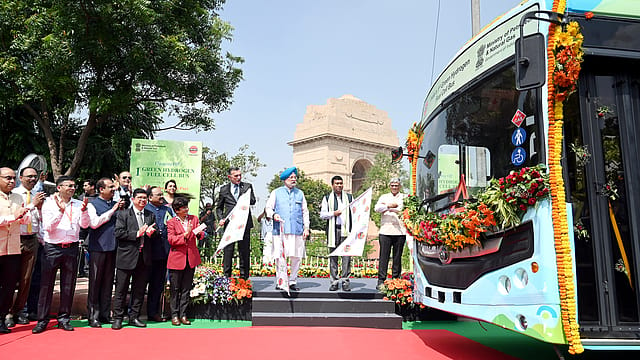Tata Motors delivers India's first hydrogen fuel cell buses to Indian Oil
ADVERTISEMENT

India's largest commercial vehicle manufacturer Tata Motors on Monday delivered the country’s Hydrogen Fuel Cell powered (FCEV) buses to state-run oil marketer Indian Oil Corporation Ltd (IOCL).
In June 2021, Tata Motors had won a tender from IOCL to provide 15 FCEV buses to evaluate the potential of hydrogen-based PEM fuel-cell technology in India. These buses are to be assessed as potential mass transport solutions for inter and intra-city commute.
Built at a dedicated lab in Tata Motors' R&D centre at Pune, these 12-metre long buses are designed for easy ingress and egress with a low-floor design, can seat 35 passengers and were delivered after successful strenuous road tests and validations, according to the automaker.
"Expertise and experiences was acquired by Tata Motors from a collaborative approach with renowned industry partners and research institutions, for adapting the advanced hydrogen-based proton exchange membrane (PEM) fuel cell technology to Indian conditions, and has played a key role in developing the buses," it says.
Speaking about the technology and innovations incorporated in these new-age FCEV buses, Rajendra Petkar, president and chief technology officer at Tata Motors, says this bus features a 350-bar hydrogen storage system, 70-kilowatt fuel cell stack, electronic braking system & stability control for higher safety, intelligent transport system, new-generation telematics for efficient, user-friendly vehicle maintenance and tracking along with roomy interiors.
"This is an important milestone for green mobility in India, harnessing the strong potential of hydrogen as an energy carrier, ushering in hydrogen economy in the transport sector," says Petkar.
As a part of the MoU, Tata Motors and IOCL will continue to make further advances in the core technology related to PEM fuel cells in the times to come, he adds.
"This is an outcome of the progressive policies of the Government, IOCL's focus on future readiness and Tata Motors’ R&D prowess, all collaborating to fulfil the common vision of clean mobility in India. The delivery of the FCEV buses to IOCL marks a significant step forward in this journey and we are grateful for the trust and support of our partners," says Girish Wagh, Executive Director, Tata Motors
"The delivery of these buses today heralds a new era in inter-city mass public transport and marks another step forward towards fulfilling the aspiration of sustainable mobility. With proactive actions to develop and adapt new age technologies, we are creating future-ready transport solutions for both cargo and people to address the mobility needs of tomorrow’s India, today," Wagh adds.
On September 23, Tata Motors launched its third vehicle scrapping facility in Surat, Gujarat. The facility has the capacity to disassemble 15,000 end-of-life vehicles safely and sustainably each year. It is developed and operated by Tata Motors' partner Shree Ambica Auto to scrap end-of-life passenger and commercial vehicles of all brands. The automaker has similar facilities in Jaipur and Bhubaneshwar.